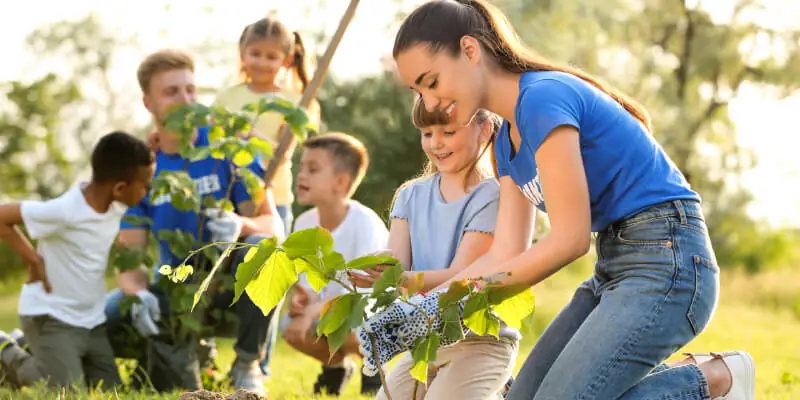Early lessons in sustainability help children grow with care, curiosity, and respect for the natural world around them.
Every small hand can make a big difference. When children learn to care for the world around them, they begin to see that their actions – even the tiniest ones – have power. Teaching sustainability isn’t just about recycling or turning off the lights; it’s about shaping how children see their place in the world.
At Nature’s Point Childcare, sustainability is woven into our daily rhythm. From muddy boots in Kirk’s Bush to curious questions about where the rain goes, our tamariki discover what it means to live gently and thoughtfully on the planet.
So, why is it important to teach sustainability early – and how can we do it in ways that
children understand and enjoy?
Building a connection with the planet
Before children can protect nature, they need to feel part of it. The best lessons start with time spent outdoors — climbing, exploring, digging, and observing.
Whether it’s collecting leaves after the rain or listening to birds in the bush, these experiences nurture a sense of wonder and belonging. When children feel connected to nature, caring for it becomes second nature.
At Nature’s Point, daily bush walks aren’t just an outing; they’re a chance for children to see the beauty, balance, and magic of the environment – something no textbook can teach
Turning everyday choices into sustainable habits.
Children learn best through real-life experiences. Everyday routines are full of teachable moments – reusing a container, turning off a dripping tap, or choosing to walk instead of drive.
By involving children in these small acts, we show them that sustainability is not an occasional topic but a way of living. Encourage simple habits like:
-
- Using reusable bottles, lunchboxes, and shopping bags.
- Passing down clothes or toys instead of buying new.
- Composting fruit peels or garden scraps together.
Over time, these patterns of behaviour build lifelong awareness and responsibility.
Learning through play and discovery
Sustainability doesn’t need to feel like a lesson – it can be playful, creative and joyful. Children love exploring, making, and experimenting, and these moments can easily become opportunities for learning about the environment.
Try nature-inspired activities such as:
-
- Creating collages with leaves and petals.
- Growing vegetables and learning how food comes from soil to plate.
- Making a mini worm farm or collecting rainwater to water plants.
At Nature’s Point, we see play as the bridge between curiosity and care – when tamariki experience nature with all their senses, learning becomes deeply meaningful.
Modelling what we teach
Children notice everything – especially what adults do. When we recycle, conserve water, or talk positively about protecting the earth, we set a living example.
As educators and parents, our choices send strong messages. We can show that sustainability is more than an idea; it’s an everyday practice. When adults model respect for nature, children mirror it in their own way – through kindness, curiosity, and gratitude.
Growing future guardians
Teaching sustainability in early childhood plants seeds of empathy, awareness, and purpose. These lessons go far beyond the classroom — they influence how children treat others, make decisions, and see the world.
At Nature’s Point Childcare in Auckland, we see sustainability as a shared journey. By connecting with nature, making mindful choices and leading by example, we’re helping our tamariki become caretakers of a world that needs their love and imagination.
The future will belong to those who understand that caring for the planet begins with the smallest hands – and the biggest hearts.




